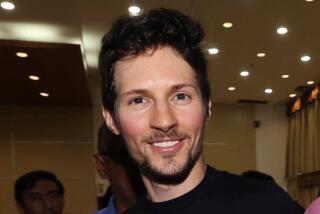Arrest May Jolt Russia’s Economy
- Share via
MOSCOW — Russia’s richest man, oil tycoon Mikhail Khodorkovsky, spent his first night in jail, sharing a small cell in a chaotic and overcrowded detention center with five other men, as officials warned Sunday that the billionaire would not get special treatment.
Khodorkovsky’s arrest Saturday, expected to trigger shocks in Moscow’s markets today, has concerned American officials. The U.S. ambassador to Russia, Alexander Vershbow, warned Sunday that the arrest could alarm foreign investors.
In a dramatic arrest, Khodorkovsky, 40, chief executive of the Russian oil giant Yukos, was picked up by the FSB -- the Federal Security Service -- in Siberia, flown back to Moscow and charged with tax evasion and defrauding the state of $1 billion -- charges many see as punishment for supporting the Kremlin’s political opponents.
“I think that following these events, foreign companies operating on the Russian market and prospective investors are going to have new doubts,” Vershbow told Interfax news agency. “Of course, we cannot comment on the legal aspects of this case, but recent events have provoked questions about whether or not Russian legislation is being applied selectively.”
Boris Nemtsov, leader of the Union of Right Forces, one of the political parties that Khodorkovsky has funded, said Sunday that the arrest sent a message that it was dangerous to hold independent views in Russia.
“This is an act of intimidation to show everyone, from the supermarket owner to the man running a kiosk, that having independent views in Russia is dangerous in political and social life,” Nemtsov told Echo of Moscow radio station.
Earlier this month, Yukos merged with a smaller rival, Sibneft, to form the country’s biggest oil company, YukosSibneft, which has attracted interest from foreign giants such as ExxonMobil and ChevronTexaco.
Thanks to high oil prices, President Vladimir V. Putin has stabilized the Russian economy but has tolerated little dissent. Independent television stations have been closed down and two of the so-called oligarchs who aired views opposed to the Kremlin line had to flee into exile to escape similar charges.
One of them, Boris Berezovsky, was recently granted asylum in Britain, and the other, Vladimir A. Gusinsky, recently defeated Russian extradition proceedings in a Greek court.
In recent months, as investigators searched his firm’s books and arrested one of Yukos’ key shareholders, Platon Lebedev, Khodorkovsky, whose assets were estimated at $8 billion, had vowed he would not flee.
The few Russians who got fabulously rich in the mid-1990s, buying up state property at bargain basement prices, are unpopular in Russia, and moves to pressure them are met with approval, even if they send shock waves through the markets.
Liberals are alarmed that a prominent businessman could be arrested apparently after supporting opposition parties. But what unsettles Russia’s markets is the fear that Khodorkovsky’s detention may signal plans to revisit the controversial privatizations of the 1990s. While government officials have brushed those fears aside, Putin has warned that economic crimes should not go unpunished.
A Moscow court ruled Saturday that Khodorkovsky should be jailed after he failed to answer a prosecution summons for questioning Friday. His company had informed prosecutors that he was away on business.
Deputy Justice Minister Yuri Kalinin said Khodorkovsky was being held in a small cell with five other inmates at Matrosskaya Tishina pretrial detention center in eastern Moscow -- fewer than the 15 normally housed in one cell.
“There are no grounds for placing Khodorkovsky in exclusive conditions,” he said. “The detention facility currently holds about 1,000 more prisoners than it can accommodate. The prison is intended for 2,500 inmates. Now it holds 3,500 and last year held as many as 8,500 prisoners.”
More to Read
Sign up for Essential California
The most important California stories and recommendations in your inbox every morning.
You may occasionally receive promotional content from the Los Angeles Times.












